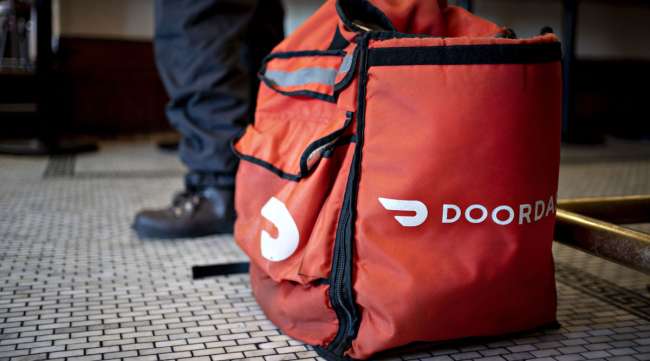Bloomberg News
DoorDash’s 86% Jump Adds to Blistering Year for Unicorn IPOs

[Ensure you have all the info you need in these unprecedented times. Subscribe now.]
Shares of unprofitable food delivery platform DoorDash Inc. surged 86% in their trading debut Dec. 9, in the latest sign of investor exuberance in what already has been a record year for IPOs.
DoorDash, which has seized on the pandemic-fueled boom in demand for delivered meals, saw its shares climb from a $102 listing price to $189.51 at closing in New York after raising $3.37 billion in its initial public offering. The first-day jump, the third biggest this year in the U.S. for a large IPO, gives DoorDash a market capitalization of $60 billion and a fully diluted value of $71.3 billion — higher than companies including Kraft Heinz Co., Lululemon Athletica Inc. and Ford Motor Co.
Investors looked past concerns that competition from rivals such as Uber Technologies Inc. may heat up next year, just as the distribution of vaccines reduces the need for at-home dining. DoorDash’s surge also bodes well for companies such as Airbnb Inc. that are looking to add to the more than $160 billion already raised by IPOs in 2020.
How did turkey-to-table change this year? What obstacles were suppliers going through to get turkeys to grocery stores? Join us as we talk with J.J. Smith, President of Valley Proteins, about how staying open-minded and flexible helped his business of delivering turkeys persevere. Hear a snippet, above, and get the full program by going to RoadSigns.TTNews.com.
The IPO is the third largest on a U.S. exchange this year, exceeded only by the $4 billion blank-check company backed by billionaire Bill Ackman and software maker Snowflake Inc.’s $3.86 billion offering, including so-called greenshoe shares.
DoorDash had 50% of U.S. market share as of October, surging past UberEats, GrubHub and Postmates, according to its filing documents. That number is up from just 17% in January 2018. DoorDash said there also is an opportunity for that market to expand, with less than 6% of U.S. residents currently using its service. Revenue in the first nine months of the year more than tripled, and its net loss narrowed from a year earlier on a surge in new customers, the company said.
Some skeptics don’t expect the increase in at-home dining to last.
“As we go from being stuck at home to wanting to venture out, people are less likely to want to go and order delivery,” said Max Gokhman, head of asset allocation at Pacific Life Fund Advisors. “They’re going to want to actually go out and go to a restaurant.”
He added that the market also could get more competitive, especially as rival Uber sees a pickup in its ride-sharing business, which could help subsidize its food delivery investment.
While DoorDash helped many restaurants stay afloat as pandemic lockdowns forced them into a takeout-only model, the fees that it charges, which can be 30% of the cost of an order, are seen as unfair by some eateries. Certain cities, including New York and Seattle, have set limits on the amount of fees delivery services can charge restaurants.
The company started by doing deliveries in Palo Alto, Calif., where Tony Xu and his two co-founders were students at Stanford University. They often did the deliveries themselves in the evenings after classes.
“It’s certainly surreal,” Xu said Dec. 9 in a Bloomberg TV interview, recalling the early days when he was “delivering hummus out of my Honda.”
Including DoorDash, companies have now raised more than $160 billion in IPOs on U.S. exchanges this year, an all-time high, according to data compiled by Bloomberg. Several more are expected before the end of the year as companies that put off listing plans during the early days of the COVID-19 pandemic regain the confidence to put their shares on public markets.
The next largest of the group is home-rental platform Airbnb, which sought to raise as much as $3.09 billion in its IPO on Dec. 9. Others include video-game company Roblox Corp., installment loans provider Affirm Holdings Inc. and ContextLogic Inc., the parent of online discount retailer Wish Inc.
Just two companies that raised more than $1 billion saw a bigger pop in their shares in their U.S. trading debut, according to data compiled by Bloomberg. Chinese online real estate platform KE Holdings Inc. climbed 87% in its first trading session, while shares of cloud-computing company Snowflake Inc. more than doubled on Day 1.
Before the pandemic, food-delivery companies such as DoorDash and rivals Uber Eats and Grubhub Inc. struggled to make money amid fierce competition among themselves and blowback over their fees and treatment of workers. Margins in the business are thin, prompting a wave of consolidation that saw Grubhub agree in June to get bought by Just Eat Takeaway.com NV for $7.3 billion, and Uber acquire Postmates Inc. for $2.65 billion in an all-stock deal in July.
DoorDash’s offering is being led by Goldman Sachs Group Inc. and JPMorgan Chase & Co., with Barclays Plc, Deutsche Bank AG, RBC Capital Markets and UBS Group AG also on the deal. DoorDash’s shares are trading on the New York Stock Exchange under the symbol DASH.
DoorDash Inc. is making its trading debut Dec. 9 after raising $3.37 billion in an initial public offering with Airbnb Inc.’s IPO set to follow within hours.
San Francisco-based DoorDash sold 33 million shares Dec. 8 for $102 each after marketing them for $90 to $95 each. The company has a fully diluted value of about $38 billion, which includes employee stock options and restricted stock units as detailed in its filings.
DoorDash’s IPO is the third-largest U.S. listing this year, exceeded only by the $4 billion blank-check company backed by billionaire Bill Ackman and software maker Snowflake Inc.’s $3.86 billion offering including so-called greenshoe shares.
Want more news? Listen to today's daily briefing:
Subscribe: Apple Podcasts | Spotify | Amazon Alexa | Google Assistant | More




